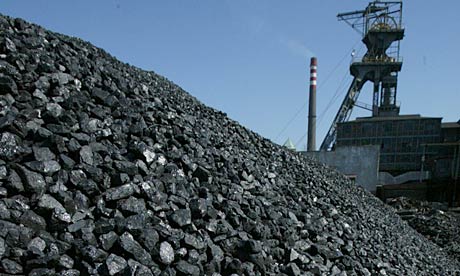Burning coal also costs companies and governments billions of pounds in disease treatment and lost working days
-
John Vidal, environment editor
- guardian.co.uk, Wednesday 12 June 2013 16.00 AEST
- Jump to comments (63)

The research, from Stuttgart University’s Institute for energy economics and commissioned by Greenpeace International, suggests that a further 2,700 people can be expected to die prematurely each year if a new generation of 50 planned coal plants are built in Europe. “The coal-fired power plants in Europe cause a considerable amount of health impacts,” the researchers concluded.
Analysis of the emissions shows that air pollution from coal plants is now linked to more deaths than road traffic accidents in Poland, Romania, Bulgaria and the Czech Republic. In Germany and the UK, coal-fired power stations are associated with nearly as many deaths as road accidents. Polish coal power plants were estimated to cause more than 5,000 premature deaths in 2010.
The cumulative impact of pollution on health is “shocking”, says an accompanying Greenpeace report. A total of 240,000 years of life were said to be lost in Europe in 2010 with 480,000 work days a year and 22,600 “life years” lost in Britain, the fifth most coal-polluted country. Drax, Britain’s largest coal-powered station, was said to be responsible for 4,450 life years lost, and Longannet in Scotland 4,210.
According to the study, Polish coal power plants have the worst health impact in the European Union. The Polish government and Polish utilities are planning to build a dozen new power plants. The utility companies with the worst estimated health impacts, according to the report, are PGE (Poland), RWE (Germany and UK), PPC (Greece), Vattenfall (Sweden) and ČEZ (Czech Republic).
Acid gas, soot, and dust emissions from coal burning are, along with diesel engines, the biggest contributors to microscopic particulate pollution that penetrates deep into the lungs and the bloodstream. The pollution causes heart attacks and lung cancer, as well as increasing asthma attacks and other respiratory problems that harm the health of both children and adults.
“Tens of thousands of kilogrammes of toxic metals such as mercury, lead, arsenic and cadmium are spewed out of the stacks, contributing to cancer risk and harming children’s development,” says the Greenpeace report, which does not emphasise the impact of coal burning on climate change.
The 300 plants produce one-quarter of all the electricity generated in the EU but are responsible for more than 70% of the EU’s sulphur dioxide emissions and more than 40% of nitrogen oxide emissions from the power sector. The Greenpeace report notes that coal burning has increased in Europe each year from 2009 to 2012.
“The results are staggering. The only way to eliminate the health impacts associated with burning coal in Europe is to phase out these dirty power plants and replace them with clean renewable energy. The current EU renewable energy target has been proven to boost renewable energy and help modernise energy systems and the economy. Europe must continue down the path of clean renewable energy by setting an ambitious, binding 2030 renewable energy target,” said Greenpeace International energy campaigner Lauri Myllyvirta.
The air pollution from coal burning comes on top of transport emissions that are still increasing despite attempts by the EU to force reductions. According to the European Environmental Agency, more than 90% of urban population in the EU is exposed to fine particle (PM2.5) and ozone pollution levels above the World Health Organisation guidelines.
Greenpeace International is calling on the European commission to come forward with proposals for a binding renewable energy target of 45% and a greenhouse gas reduction target of at least 55% by 2030
